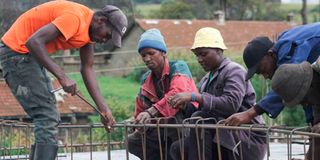High input prices bog construction industry

Lucy Wangui (centre) a skilled metal steel worker with her colleagues at a construction site in Elburgon, Nakuru County.
An increase in the cost of steel, fuel, paint and labour slowed down growth of the construction sector in the third quarter of last year.
The latest data released by the Kenya National Bureau of Statistics (KNBS) shows the industry grew modestly compared to a similar period last year mostly driven by rising cost of construction inputs as well as muted development in the level of credit extended to players.
The total value of construction activities in the quarter rose marginally to Sh205.05 billion up from Sh203.62 billion in the second quarter, compared to the impressive growth from Sh183.12 billion to Sh192.26 billion the previous year. “Performance of this sector was relatively slower in the third quarter of 2021 compared to the corresponding quarter of 2020,” said KNBS.
“The sector recorded a growth of 6.4 per cent in the third quarter of 2021 compared to 12.5 per cent growth in the third quarter of 2020,” it said.
However, the sector was boosted by a 27.5 per cent increase in cement consumption from 2.02 million tonnes to 2.58 million tonnes in the same period.
This was largely driven by lower cement prices and a beehive of multi-billion shilling public sector construction activities such as the Nairobi Expressway and government-funded low cost homes through the affordable housing programme.
The KNBS data shows the consumer price index (CPI) of cement has been steadily falling in recent years on higher local production of the product as well as increased importation.
The CPI for cement has fallen from 100 from the base period in December 2019 to 96.32 in Q4, which basically means if a unit of cement cost Sh100 two years ago for instance, the same now sells for Sh96.32.
The level of credit advanced to the construction sector by lenders also only increased by 0.9 per cent to Sh358.4 billion in the quarter, curtailing the sector’s growth.
However, there was decline in import of quantities of some construction materials such as petroleum bitumen and iron and steel during the review period due to shortage in exporting markets amid rising demand.
Meanwhile, global supply shortages have also seen steel and reinforced bars prices rapidly shoot up with the commodity’s CPI increasing to 131.81 up from 129.29 during the period.
Steel is the single second most important construction implement in the basket of construction commodities tracked by KNBS, with its price making up an average of 10.69 per cent of the total construction costs only behind cement (14.18 per cent).
At the same time, a surge in global crude oil prices has also put pressure on local fuel prices, raising its cost to a CPI of 102.3 in Q4 up from 100.79 in Q3.





